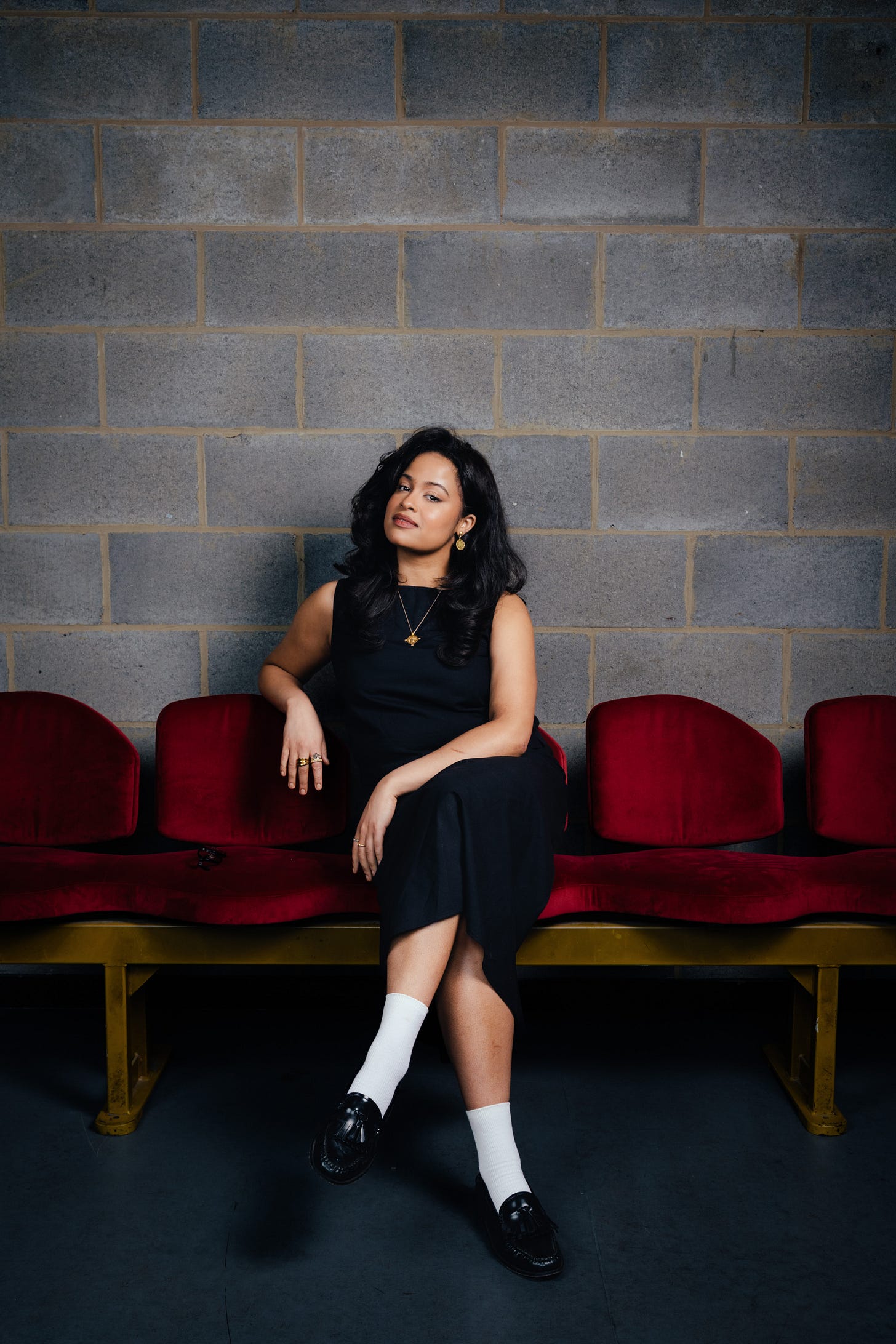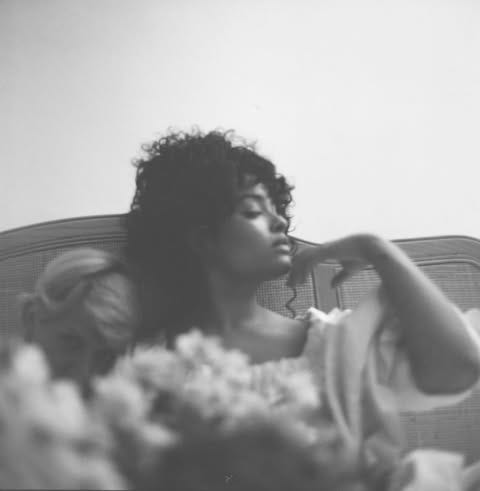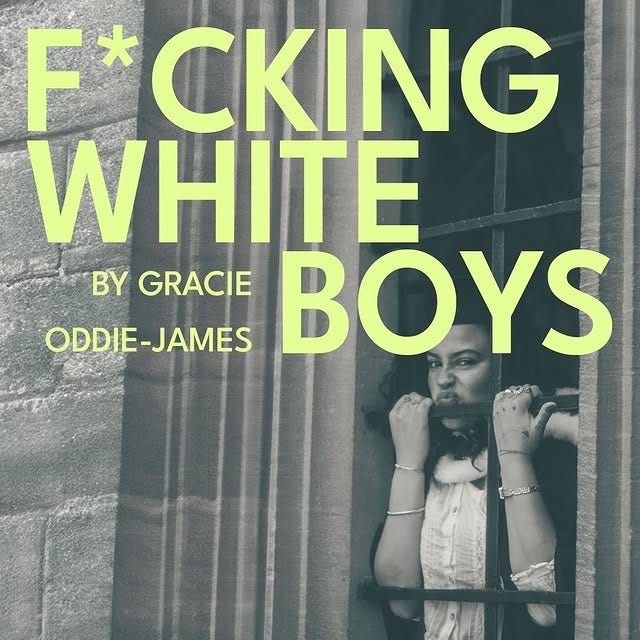Gracie Oddie-James: “I don't want to feel like I'm claiming something I don't have the qualifications for”
The playwright on class divides, fetishisation in dating and why the onus is always on mixed people
This week’s guest is actor and writer Gracie Oddie-James, who is of mixed-French, Russian Jewish, Grenadian, Caribbean and French Creole heritage. Gracie’s play, F*cking White Boys, is showing as part of National Youth Theatre’s StoryFest, inspired by her experiences as a mixed heritage woman at Oxford University, exploring sex, privilege and who's fetishising who. This is the theatre's hottest ticket right now, but even if you can’t get a seat in the theatre, you can read Gracie’s story below.
Tell me a bit about your background.
My mum is English with French and Russian Jewish ancestry. My dad is Grenadian and Caribbean with some French Creole ancestry. I describe myself as mixed-race.
I used to do temping jobs and people would always decide where I was from. I’ve had Somali, Latina, East African, Moroccan, Sri Lankan, Native American… I’m happy to be a citizen of the world.
What kind of environment did you grow up in?
I grew up in North West London, which could be described as a very diverse environment, but I had quite a specific experience within that which collides with class.
We lived in Kentish Town and my white grandparents lived in Hampstead, they were very middle class bohemian artists. Not the same vibes as my Black family, who were much more working class, first or second generation immigrants in Hackney. My father also didn’t have the closest connection with his family so they weren’t a large presence in my life. Living along that binary was quite interesting. Growing up, I really resented it.
My secondary school was quite diverse, it’s just that most of the friends I had were white middle class girls. I always sounded a bit posh, and I thought ‘if I try to be this version of what Black is, that's just going to be weird.’ I’d rather feel like an outcast in the white people that I’m always an outcast in any way.
Did you feel the classic push and pull of not being Black or white enough?
I've always been unapologetic. It’s my default setting which, as I enter my 20s, I'm starting to think is probably something to do with my neurodiversity. It's definitely not always been like this. There was a time where I was crying because I was really fucked off about not being white or not being Black. I felt like if I straightened my hair, I could try and pass as white and then maybe it would feel less confusing. I clocked that being Black was difficult at quite a young age.
I don't think I'm a worse off person because I have a white mum – I hate those TikToks – but growing up as a mixed-race woman with a white mum was difficult in the context of body image. She has very straight white lady hair, and through no fault of her own I learned to resent my hair from very young. My mum loved my hair, but my mum didn’t understand the concept of using other products than shampoo and conditioner and people and school would say things.
When it comes to my body, my mum is a five foot tiny little white lady. All the white women in my family were tiny. Growing up, I realised I didn’t look the same. My dad would tell me I look like my aunties, but that doesn’t mean anything to me when I don’t know where they are.
Did you have conversations about being mixed with your family?
By the time I was 13, my dad wasn’t living with us. Living with just my mum, we had some really deep conversations that I don't think some mixed-race people are able to have with their parents until they're much older. We spoke about her dating a lot of Black guys and what that was about. My dad also went out with a lot of white ladies. If my dad doesn’t fancy Black people, then how can I trust that I’m beautiful?
I remember going to Grenada when we were young and coming back with my first ever Black doll and a couple of children’s books about Grenada. They’re burned into my mind, because having them was the first time I felt this was a whole culture that I’m part of. Even at carnival, I sometimes shy away, even though they’re very accepting, because I don't want to feel like I'm claiming something I don't have the qualifications for. If that was all present in my childhood then maybe I wouldn’t feel that, but also, is there a way to reclaim that as an adult?
How does your heritage play into your work as a playwright?
Being a writer was a complete mistake. I always wanted to be an actress. When I started doing shows at Oxford University, it became very apparent that my race was getting in the way of castings. I didn’t want this whole thing of being a demanding Black woman, but when I called it out, it became inescapable for me – it had to come into my work.
Towards the end of my time at Oxford, I was recording weird interactions I had with white men who I fancied. I wrote a play based on it after years of trying to escape having to deal with race because it was tiring. Now, whenever I want a role, I’m just going to write it for myself. One day it won't always be so tied to that, but I find it hard to write without at least undercurrents of that experience.
I love the title of your upcoming show, F*cking White Boys.
Through dating those people, or having those unpleasant experiences with people, it forced me to recognise things about where I was coming from. People will always make fun of me and say I have a type, but all the onus gets put on you as a mixed-race girl, asking ‘why do you keep dating these white boys?’ instead of ‘well, why do these white boys keep dating me?’
What’s the best thing about being mixed for you?
I really wanted a binary of being here or there, and I remember my mum saying “your gift is that you have perspectives on so many different ways and walks of life.” As an actor and writer, and also a person in the world where privilege is such a big question, being able to empathise with many different life states and lived experiences is a benefit.
How would you sum up your mixed experience in one word?
Mercurial. It's liquid, it's heavy, it’s fluid, it can be in many forms. Sometimes that's really interesting, intriguing and beautiful, sometimes it's like, ‘dude, this is poisonous, don't touch that, wear gloves.’
Get your tickets to F*cking White Boys here now. Next week, I’ll be speaking to author Emma Strenner. Subscribe to get Mixed Messages in your inbox on Monday. Shop Mixed Messages tote bags and bookmarks on Etsy now!
Enjoy Mixed Messages? Support me on Ko-Fi! Your donations, which can start from £3, help me pay for the transcription software needed to keep this newsletter weekly, as well as special treats for subscribers. I also earn a small amount of commission (at no extra cost to you) on any purchases made through my Bookshop.org and Amazon affiliate links, where you can shop books, music and more by mixed creators.
Mixed Messages is a weekly exploration of the mixed-race experience, from me, Isabella Silvers. My mom is Punjabi (by way of East Africa) and my dad is white British, but finding my place between these two cultures hasn’t always been easy. That’s why I started Mixed Messages, where each week I’ll speak to a prominent mixed voice to delve into what it really feels like to be mixed.












I so rarely read mixed race experiences about people who were raised predominantly by one side of their family, which I relate with strongly. I've always felt incomplete in comparison to those who were raised with heavy influences from both sides of their family. It's refreshing to read this perspective, and I'm sure many others share it! <333
Great interview! The questions are right on point...I've never had anyone ask me any of this. Well, I've had people ask me if I'm from North or South Korea....we really need a school system redesign.